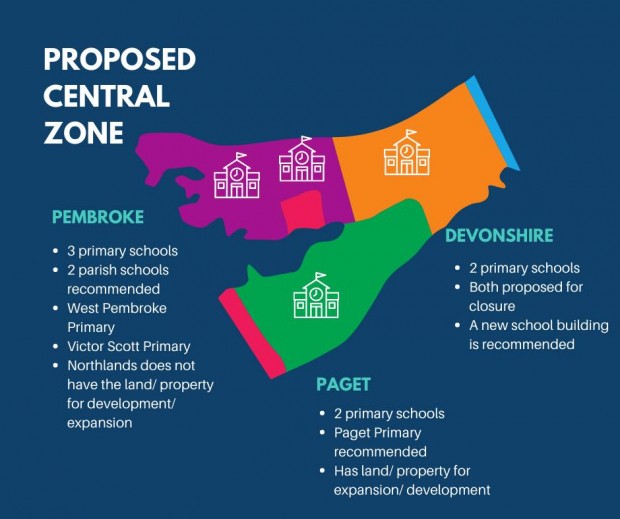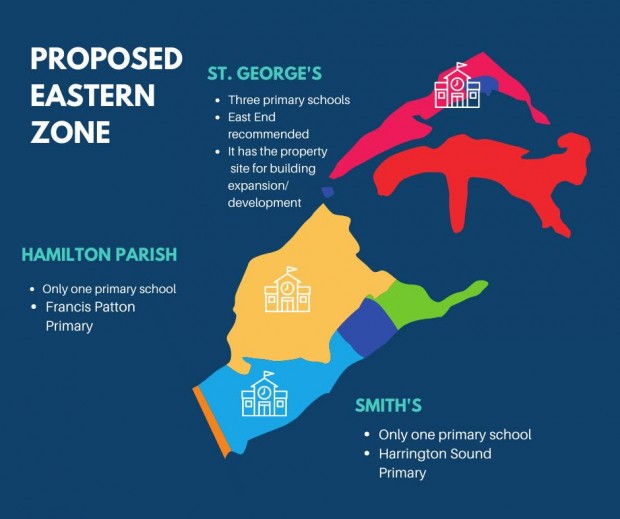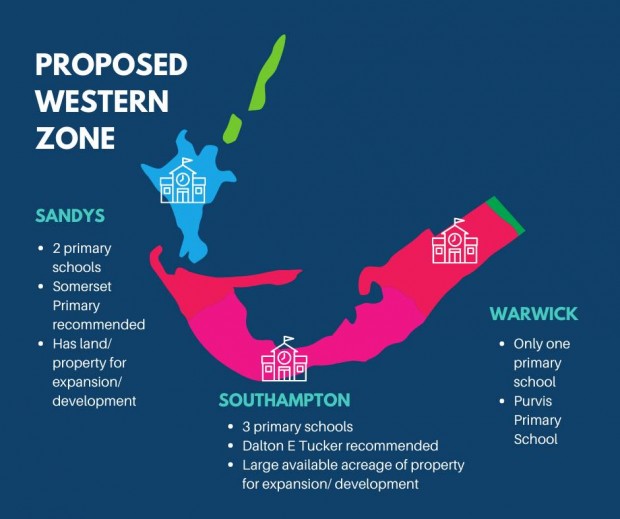Minister On Parish Primary Schools Proposal
The proposal is to reduce the number of primary schools from 18 to 10 with a maximum class size of 15 students, and a decision has not been made yet and consultation is still underway, Minister of Education Diallo Rabain said in the House of Assembly today [Feb 19]
The Minister was providing an update on the Ministry of Education’s consultation process for the proposal to introduce parish primary schools.
“The consultation document, which outlines the vision and plans for transforming public education, was released to the general public during mid-December for their reading and understanding,” Minister Rabain said.
“In essence, the proposal is to reduce the number of primary schools from 18 to 10 primary schools, recommending 1 primary school per parish, except for Pembroke parish that will have two primary schools. The part of the consultation process involving stakeholder meetings commenced earlier this year in January.
“The Ministry collects each and every consultation submission and takes note of all response and information shared during these meetings. Every meeting is also recorded.
“During the consultation meetings thus far, a number of reoccurring themes have emerged. There is a common thread, indeed. Participants have asked about the implementation timeline for the introduction of parish primary schools and potential closures.
“I would like to reiterate that a decision has not been made on primary school closures. We have presented a proposal on the introduction of parish primary schools to start a national discussion. Therefore, at this point, a specific timeline for implementation cannot be provided. We intend to give careful consideration to every submission and feedback so that an informed decision is made.
“During every meeting, stakeholders have asked where is the funding coming from for the possible refurbishment, renovations and/or rebuilding of primary schools. I must emphasize that the Government is fully committed to funding education reform and transforming the Bermuda public school system.
“Additionally, the Ministry is currently looking at various funding options, including public-private partnerships that have demonstrated proven financial support for big-ticket building facilities and projects.
“We want to assure our stakeholders that the funding will be provided, more importantly right now, is to develop a blueprint of what our primary schools will look like. This blueprint can then be assessed for costs, timelines and roll out, given the resources needed.
“Another reoccurring question centres around the potential of overcrowding of school buildings and classrooms. If the consultation’s outcome is to have parish primary schools, those schools selected will be refurbished or rebuilt to accommodate up to 300 students.
“The Ministry is also proposing a maximum class size for primary schools of 15 students. The school enrolment projections also show steady declining student enrollment for each parish up to the year 2027. The school enrollment projections support a decision of 300 students per school with a maximum of 15 students per class. Therefore, overcrowding would not be an issue.
“There is a fear that closing particular schools would eradicate that school’s history or legacy. Mr Speaker, history or legacy is carried on by people and what they do with information, knowledge, and past experiences.
“Therefore, there are many ways to preserve the legacy of experiences attached to school buildings. Examples include renaming school buildings and/or classrooms, writing the history in the school curriculum, or establishing a history hall of fame. This has been done in the past and can continue.
The Minister’s full statement follows below:
Mr Speaker,
This morning, I rise to provide my Honourable colleagues with an update on the Ministry of Education’s consultation process for the proposal to introduce parish primary schools. There have been comments in the public domain recently that have not represented our proposed Education Reform’s true nature. I hope to clarify what has been happening with this statement.
Mr Speaker,
Let me first cast my Honourable colleagues’ minds back to December 2020 when I provided an update on Education Reform. At that time, I shared four Education Reform domains that were either in train or about to start. These were:
- 1. The development of an Education Authority;
- 2. The implementation of the Learning First Program;
- 3. The phasing out of middle schools and the introduction of signature schools; and,
- 4. A consultation process on the introduction of parish primary schools.
Mr Speaker,
Much progress has been made on the research and work needed to implement recommendations for an Education Authority fully. I am most pleased with the focused efforts of the Committee, who have been charged with developing options that can be considered for governing the transformed public school system. I expect a report outlining these from this Committee in April.
Mr Speaker,
The Learning First Programme commenced their work in October 2020, and the Design Team members have re-grouped since the Christmas break. You will recall that in December, I reported that the Team of 54 members consisted of:
- a. 16 teachers and educations support staff [i.e. para-educators and allied professionals];
- b. 12 community/cultural members [not for profit, community leaders and school board members];
- c. 9 school leaders [principals, deputy principals, teacher mentors];
- d. 9 members with education system experience [curriculum, education and policy officers];
- e. 6 parents and/or family members; and,
- f. 2 industry/business partners [private sector].
All of whom brought with them a diversity of knowledge, skills and technical abilities.
Mr Speaker,
The Team has been working on identifying national and core educational priorities; understanding design thinking, and delivering better learners’ outcomes. The work’s overall objective is to prepare support for the delivery of new learning experiences for our students. The Design team has now identified six national and core educational priorities that sit at the heart of the public school system’s transformation journey. These include:
- 1. Principles and values: to guide decisions about what great learning looks like.
- 2. Pedagogical Framework: that will design teaching and learning to engage, challenge and inspire young people.
- 3. Curriculum Framework: to design a vibrant, 21st-century curriculum that will give young people the knowledge, skills and values they need to succeed.
- 4. Graduate Outcomes: for designing new ways to recognize and certify learning for a range of college and career opportunities.
- 5. Education Workforce Strategy: for designing high-level professional learning and development that teachers and school leaders need to shape the next generation.
- 6. Learning Environments: – designing diverse, engaging, on-and-offline learning spaces to shape where, when and how young people learn in the future
The design team is currently engaged in a series of evening workshop sessions during the next two weeks. They will concentrate on each of these six national priorities to develop prototypes for new learning experiences, which will be tested amongst varied stakeholder groups in the broader community. The intent is for our children and teachers to engage in learning of excellence.
Mr Speaker,
The work also continues with the phasing out of middle schools and the introduction of signature schools. The Ministry Team has been diligently working with Chambers to ensure legislation is drafted to achieve this. Amendments to the Education Act will shift the education system from a 3-tier to a 2-tier system. As shared previously, the legislation will amend the age range for primary school education to 12 years which includes the current M1 and M2 years; introduce senior level signature school education and amend the age to start at 13 years to include the current M3 year. The new legislation will also establish exceptionalities and alternative education for students. The Bill will be tabled during this Session of the Legislature.
Mr Speaker,
At this time, I will dive into greater depth to provide an update on the proposal’s consultation process for the introduction of parish primary schools. The consultation document, which outlines the vision and plans for transforming public education, was released to the general public during mid-December for their reading and understanding. It invites critical stakeholders and community participation in a consultation on a proposal to introduce parish primary schools, including primary schools recommended for closure. In essence, the proposal is to reduce the number of primary schools from 18 to 10 primary schools, recommending 1 primary school per parish, except for Pembroke parish that will have two primary schools. The part of the consultation process involving stakeholder meetings commenced earlier this year in January.
Mr Speaker,
Let me start with an overview of the consultation, which began with internal stakeholder groups. The Ministry held consultation meetings with Ministry and Department Staff, the Board members, representatives from all three Unions, Principals and Preschool Administrators. These meetings were the first to be held during January. During the first weeks in February, the consultation meetings continued with two public meetings. The general public was invited to attend, hear the proposed parish primary schools’ presentation, ask questions, give their input and/or suggestions.
Mr Speaker,
The Ministry has also held a total of eight parish meetings for stakeholders who live in the respective parish that could potentially be affected given the proposal. Two meetings were held for St. George’s Parish stakeholders and education advocates, two for Smith’s Parish, two Devonshire and two for Pembroke parish residents. All consultation meetings are undertaken using the virtual platform Zoom. Participants register for the meeting they are interested in attending and can submit questions in advance.
Mr Speaker,
All consultation meetings held on Mondays and Thursdays are also broadcasted on the Government’s CITV and streamed on the Bermuda Government’s Facebook Live and YouTube channels. The Ministry aims to have as wide a reach as possible to the Bermudian the community. The YouTube and Facebook streams are monitored, and any questions posted on there are recorded. Additionally, these questions, as much as possible, are answered during the Zoom meeting.
Mr Speaker,
The consultation meetings’ structure comprises a presentation sharing information and data, two question and answer segments, and the administering of two polls. The presentation provides all participants with an overview of why the need to transform the Bermuda public education system. It paints a clear picture of the vision for 21st-century learning, highlighting visuals of what a 21st Century learning environment will look like for our children.
Mr Speaker,
Participants in the meeting receive a detailed account of the study factors considered that forms the basis for determining what school location building sites to propose for each parish. The proposed primary schools per parish are shown by school zone, and an explanation of the scoring is shared. During the Parish consultation meetings, the presentation goes into further depth, explaining the scoring for all the primary schools in that respective parish. Participants are given ample opportunity to engage, ask questions, and provide input and suggestions on the proposal.
Mr Speaker,
The Ministry collects each and every consultation submission and takes note of all response and information shared during these meetings. Every meeting is also recorded. In fact, we have established a Mentimeter for documenting all questions and comments received. This database of information will be considered in the decision-making process. I personally receive a weekly update of consultation submissions received and read each one as the consultation meetings progress. Also, I have found it very enlightening by participating in each of the meetings and hearing directly from participants. This has helped me understand the thoughts and positions of parents, education advocates, staff and the general public regarding the proposal for parish primary schools; and, hear directly.
Mr Speaker,
To date, the Ministry has received a total of 65 written submissions via the consultation email link. The majority of the responses have been from parents or extended family members. This is good. We encourage everyone to complete a consultation form and share their ideas, any alternative proposals or suggestions. The transformation of the public school system is of national importance. Therefore, the Ministry needs everyone to contribute so that the best decision is made for our children today, and future generations.
Mr Speaker,
During the consultation meetings thus far, a number of reoccurring themes have emerged. There is a common thread, indeed. Participants have asked about the implementation timeline for the introduction of parish primary schools and potential closures. Mr Speaker, I would like to reiterate that a decision has not been made on primary school closures. We have presented a proposal on the introduction of parish primary schools to start a national discussion. Therefore, at this point, a specific timeline for implementation cannot be provided. We intend to give careful consideration to every submission and feedback so that an informed decision is made.
Mr Speaker,
The Ministry is often asked why are the high performing schools being proposed for closure. Stakeholders must know that the Ministry is consulting broadly to obtain as much feedback and input as possible. A powerful vision for learning has been proposed, and that vision cannot be achieved with the school buildings of the past nor the teaching and learning styles of the past. Thus, careful thought went into determining the school building sites recommended for parish primary school locations. It is critical for these sites to have the potential for expansion and development to support the new vision for learning. It would not be fair nor prudent to propose school building sites based on the performance when there are many other social and economic factors that impact a child’s school performance. We must have a system that caters to all of our students and their needs. It is important to meet them where they are.
Mr Speaker,
During every meeting, stakeholders have asked where is the funding coming from for the possible refurbishment, renovations and/or rebuilding of primary schools. I must emphasize that the Government is fully committed to funding education reform and transforming the Bermuda public school system. Additionally, the Ministry is currently looking at various funding options, including public-private partnerships that have demonstrated proven financial support for big-ticket building facilities and projects. We want to assure our stakeholders that the funding will be provided, more importantly right now, is to develop a blueprint of what our primary schools will look like. This blueprint can then be assessed for costs, timelines and roll out, given the resources needed.
Mr Speaker,
Another reoccurring question centres around the potential of overcrowding of school buildings and classrooms. If the consultation’s outcome is to have parish primary schools, those schools selected will be refurbished or rebuilt to accommodate up to 300 students. The Ministry is also proposing a maximum class size for primary schools of 15 students. The school enrolment projections also show steady declining student enrollment for each parish up to the year 2027. The school enrollment projections support a decision of 300 students per school with a maximum of 15 students per class. Therefore, overcrowding would not be an issue.
Mr Speaker,
There is a fear that closing particular schools would eradicate that school’s history or legacy. Mr Speaker, history or legacy is carried on by people and what they do with information, knowledge, and past experiences. Therefore, there are many ways to preserve the legacy of experiences attached to school buildings. Examples include renaming school buildings and/or classrooms, writing the history in the school curriculum, or establishing a history hall of fame. This has been done in the past and can continue.
Mr Speaker,
The consultation meetings have been very engaging overall. Participants have indicated through the Polls that they have been given ample opportunity to ask their questions and share. This is what we want to achieve. The consultation process will continue during the next two weeks as the Ministry holds specific meetings for Paget, Southampton and Sandy’s Parishes. On March 8th there will be one last public meeting for anyone interested in improving public education to attend. The consultation process will conclude on March 12th. Following this deadline, technical officers will be busy gathering all the data and feedback, collating responses, and preparing a detailed analysis in report form that will be shared with the public. I intend to communicate a final decision before the end of the school year.
Mr Speaker,
Let me close by first thanking the dedicated and committed officers in the Ministry and Department of Education. They have sacrificed their family and personal time during the past few weeks each night to host the consultation meetings. We have a strong team who only want to do what is best for children, and position them for success. Also, I encourage my Honourable colleagues and the general public to become involved.
Mr Speaker,
If Education Fails, Bermuda Fails. We all need to be on the same page, the Government, the Opposition and the Public. Public education is of national importance. We need your feedback and to hear from you. I urge members here and the public to register to attend one of the remaining consultation meetings to learn about the proposal to introduce parish primary schools. Take some time to complete a consultation submission form by visiting the www.moed.bm website. Let’s make this a national effort to transform public school education.
Thank you, Mr Speaker






“The proposal is to reduce the number of primary schools from 18 to 10 with a maximum class size of 15 students, and a decision has not been made yet and consultation is still underway, Minister of Education Diallo Rabain said in the House of Assembly today [Feb 19]”
Wow, that suggests a fall in the primary school age population of around 50%!
Who is going to be left in Bermuda to pay taxes when I qualify for my social insurance pension?